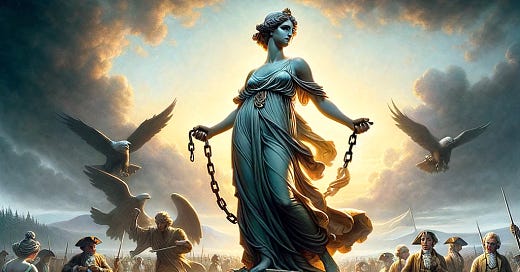The Anti-Federalists: Voices of Dissent in America's Founding
The Sleeper pick Americans
The Anti-Federalists, often undervalued compared to the Federalists, played a crucial role in shaping the foundational debates of the American Constitution. Their concerns and arguments resonate with insights into the democratic ethos that echo ancient philosophical critiques, such as those by Plato. They feared that a strong central government could evolve into tyranny, distancing itself from the states' and individual citizens' needs and rights.
Background and Core Beliefs
The Anti-Federalists were a loose-knit group of early American politicians, thinkers, and small farmers, who were against the ratification of the Constitution in 1787. They weren't one cohesive faction with one philosophy but were gelled together by one common fear: the potential of overreach by the feds and erosion of people's freedom and state power. Foremost among them were Patrick Henry, George Mason, and Samuel Adams, who, all in one voice or the other, had given a statement reflecting great concern for the absence of the Bill of Rights in the original document.
Democratic Concerns
Democratic fair-play Anti-Federalists were fearful of the kind of majority rule that could silence the minority, just like Plato's skepticism of democracy. They argued that a broad-based republic such as that which the Federalists were proposing would be unable to represent its highly diversified people effectively, therefore creating a separation between the rulers and the ruled. They were afraid this would open the door for a tyranny of the majority and eventually for the rise of demagogues, not much unlike those Plato was criticizing in his portrayal of democracy.
State Sovereignty and Individual Rights
The Anti-Federalists championed state sovereignty since, to them, state governments, being closer to the people, understood the interests of citizens better than the national government. They argued that the Constitution granted too many powers to the national government, neglecting those of the states. It was this incessant demand that led to the eventual constitution framers drawing up the Bill of Rights giving the protection of some basic freedoms - freedom of speech, assembly, and religion.
Starting from scratch, the Anti-Federalists may have been unsuccessful in denying the ratification of the Constitution, but their legacy is continued in the Bill of Rights.
Impact and Legacy
Their impact on American democracy is so profound because of protect critical amendments that kind of give a framework against the very tyranny they feared. This notion in their philosophy showed a democratic bend - protection of the individual's freedom, ensuring a check on government power.
Reflection
Much like Plato's urging to govern with the wise, the Anti-Federalists were urging a more direct involvement of the people in their government by empowering the states and securing individual rights more clearly. Thus, in so doing, they remind us that the road to a democratic and just society is quite thorny and difficult and needs at any time vigilance and adaptation to maintain the rights and freedoms of all humans. Reflecting on the contributions of the Anti-Federalists, one is overtly reminded that they, just like those philosophers of the old, provoke our in-depth thought and inquiry into our governance architecture, pushing us toward finding that system that indeed reflects democratic equality, justice, and freedom.
Citations
"Nathaniel Macon," Encyclopædia Britannica. Accessed March 30th, 2024. https://www.britannica.com/biography/Nathaniel-Macon.
"The Anti-Federalists and Their Important Role During the Ratification Fight," National Constitution Center. Accessed March 30th, 2024. https://constitutioncenter.org/blog/the-anti-federalists-and-their-important-role-during-the-ratification-fight.




